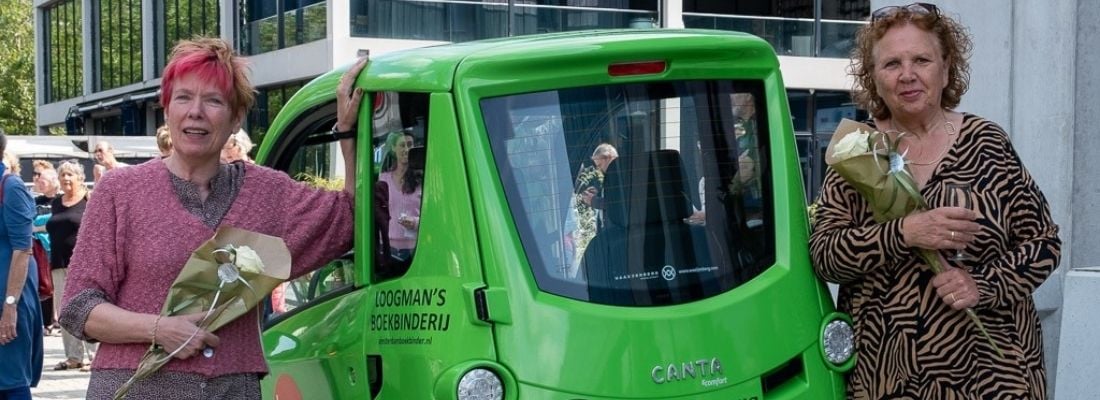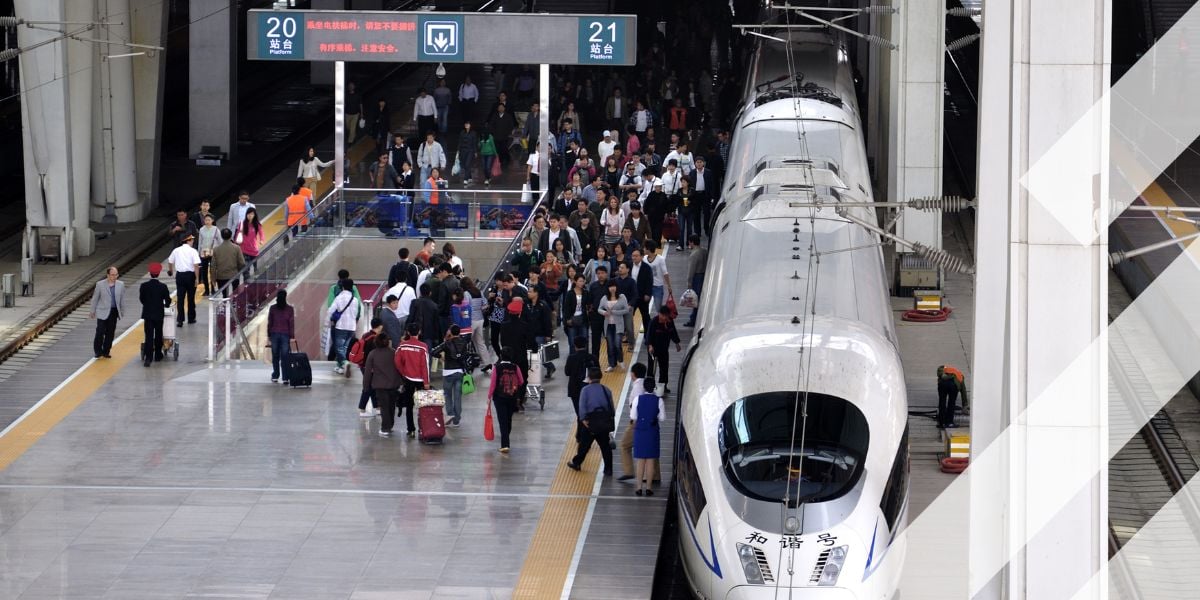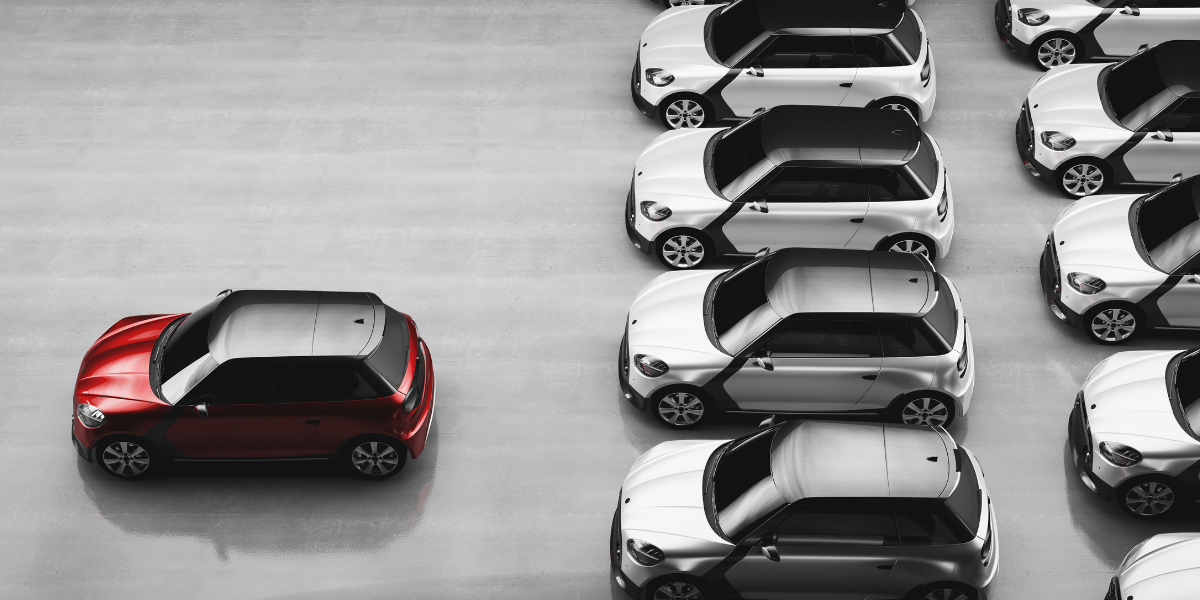Speeding up the mobility transition: Stichting HeenenWeer
With the continuous growth of the population and ongoing urbanization there are numerous mobility challenges. Sustainability, safety and societal impact are amongst our daily concerns. We need to speed up the mobility transition to keep up with the fast changing global dynamics, which requires inventive approaches and better solutions. In this series we share inspiring and innovative cases from all over the world. We spoke to the two founders of Stichting HeenenWeer, (Back & Forth Foundation), a mobility service for disabled residents. How do Mia and Titia speed up the mobility transition?
Stichting HeenenWeer is a mobility service for disabled residents of the Pijp and the Rivierenbuurt in Amsterdam, set up for and by the neighbourhood. In bright green cars, 35 volunteers from the neighbourhood drive neighbours with walking difficulties around for short distances. Back and forth to the supermarket, doctor, physiotherapist or, maybe even more important, to a good friend to have a cup of coffee with. Thanks to the 8,000 rides yearly, they help their neighbours to live independently at home for longer, to maintain social contacts and to take part in the neighbourhood.
Mia and Titia came up with the idea and started in 2015. “Since 2015, the municipalities have been responsible for, among other things, care for the elderly. This decentralization was accompanied by major cutbacks and an appeal was made to citizen participation and self-sufficiency of the citizens. With that task in mind, we started thinking about what we need as future elderly people and what we can arrange ourselves. ‘Shelling your own beans’, we call it in Dutch. From experience in elderly care, we organised a brainstorm with our local community to see what we would need if we had to take care of ourselves in the future. One of the things particular for our neighbourhood is that there is so much to do, but getting there and taking part in these activities seemed a big problem. That is how we came up with the idea of the HeenenWeer (Back & forth) foundation.”
“I used to charge the electric vehicles in front of my door, putting the plug through my window.”
“It wasn’t long until we received the first donation: 18,000 euro! We really had to start something! So we bought two second hand small Chinese cars and we started driving the elderly from A to B. Today we make use of Cantas (a small car for disabled people), because they have a much better battery. Previously, I would need to charge the vehicles every hour, so I actually leave the vehicle in front of my door and put the plug through the window of my own home. They needed charging almost every hour.”
“People who are not able to walk short distances can use our mobility service. You register online, receive a pass with which you pay one euro per ride. Most people go to activities with a friend or to the supermarket, dentist or physiotherapist.”
“A small group of social drivers is more efficient and personal.”
“Before COVID we had five small electric vehicles via a lease contract. Every car costs 7,500 euro lease a year. The driving is done by 35 volunteers from the neighbourhood; the social drivers. A small group, but it is actually more efficient. All volunteers are scheduled half a day per week to drive, but if someone has to take over we can easily ask around in the Whatsapp group.”
“For the costs we make for the vehicles, we always need funding and sponsors. Most of our income is from funds, but also from local entrepreneurs such as the bakery who wants to sponsor us by logo placement on the vehicles driving around. We also started a crowdfunding project, because we want to activate local neighbours to sponsor us as well if they don’t have time to volunteer. We want to reach 8,000 euros to make sure we can let one vehicle drive for a year. We hope to motivate young people to sponsor us.”
“We work together with local care facilities and general practitioners who refer neighbours. On top we are very happy to work together with RAI Amsterdam. Our vehicles are parked for free at the parking lot of the RAI and charged for free. The vehicles are parked where no other cars can park, so RAI does not miss out on any costs. We make use of the Hospitality Centre, where we can leave the keys and other belongings in lockers. Our volunteers always feel welcome and they get to know RAI in a different way too.”
“People underestimate the impact of not being mobile.”
“People underestimate what a large impact it has when you are not mobile enough. This has such a big impact on your social life. People live on the second or third flour and only dare to ask family members or friends to bring you to the doctor, but when it comes to activities you really like such as drinking a cup of coffee on a terrace, you don’t want to bother your love ones.”
“We are more than just a transport service. Our volunteers listen to the customers’ stories and know if they are feeling well. I still remember a story of a women who had not been at the local fish stand at Albert Cuyp for three years. When she came back, she said: ‘They still knew me!’ Another woman visits her dementia husband at a homecare centre. Every goodbye, he did not understand why she left again and he wanted to come with her. You listen to her story and help her out. A 90 year old woman volunteers at a home care facility. She is really happy to use our service, because she can save her energy to help others.”
Text after video
“We need to be able to take care of ourselves, each other and the people around us.”
“It is really great to be able to help other people. That is what we want ourselves, when we get older. We need to be able to take care of each other and the people around us. Even in a time of COVID. Since COVID and social distancing we needed a larger vehicle, so we changed two out of five smaller vehicles for one bigger one, a sort of golf cart. We change and we grow! Other neighbourhoods will start a franchise foundation running their own transport service with its own board, own volunteers, sponsors etcetera. They become part of a larger association which we are setting up lately. We can help more people take part in society! This is the sustainable mobility and care service of the future!”
Are you inspired by their story or do you have questions for Mia and Titia, let us know.
Share your story
Do you have an innovation, research results or an other interesting topic you would like to share with the professionals in the infrastructure, traffic management, safety, smart mobility and parking industry? The Intertraffic website and social media channels are a great platform to showcase your stories!
Please contact our Sr Brand Marketing Manager Carola Jansen-Young.
Are you an Intertraffic exhibitor?
Make sure you add your latest press releases to your Company Profile in the Exhibitor Portal for free exposure.







